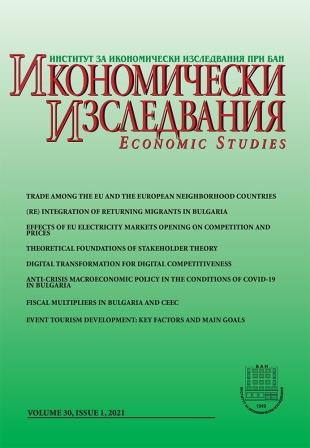Fiscal Multipliers in Bulgaria and Central and Eastern Europe Countries
Fiscal Multipliers in Bulgaria and Central and Eastern Europe Countries
Author(s): Sonya GeorgievaSubject(s): Economy, Business Economy / Management, Financial Markets
Published by: Институт за икономически изследвания при Българска академия на науките
Keywords: JEL: C32; E01; E62
Summary/Abstract: The importance and possibilities of fiscal policy have been neglected by academics and politicians for decades after the macroeconomic revolution of 1970-1980. However, the Great Recession, the crisis in the European Union and the prolonged recession in many European economies have once again put fiscal policy, and especially its stabilizing role, at the centre of expert and public discussions. In countries with a high share of the public sector in the economy and whose monetary policy is constrained by various structural features of the economy and the financial system, the role of fiscal policy is particularly important, and it is a key lever of economic policy. These features characterize most countries in Central and Eastern Europe (CEE), which makes this region convenient for analyzing the effectiveness of the fiscal policy. The study empirically establishes the effects of shocks in budget expenditures and tax revenues on GDP in Bulgaria, Estonia and Lithuania for the period 1995-2018, applying the vector autoregression technique known as the Vector Autoregressive Model (VAR) as well as other, non-econometric valuation methods. Key factors that affect the dynamics in the size of fiscal multipliers are presented numerically and graphically.
Journal: Икономически изследвания
- Issue Year: 2021
- Issue No: 1
- Page Range: 131-167
- Page Count: 37
- Language: English

